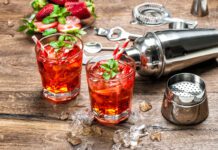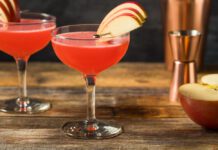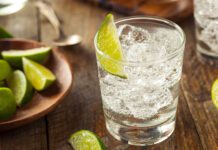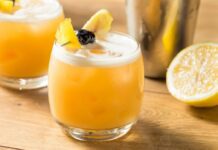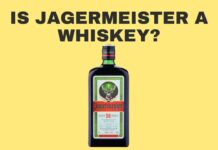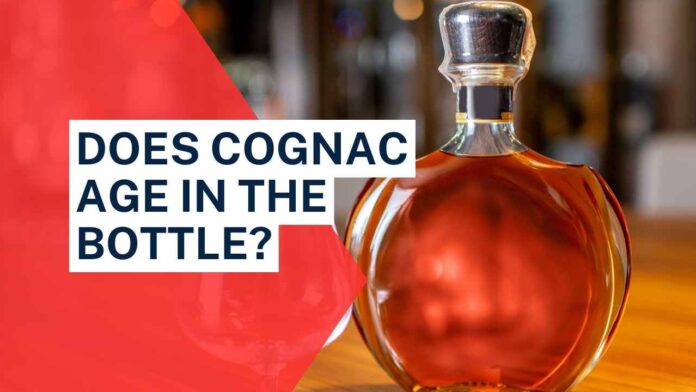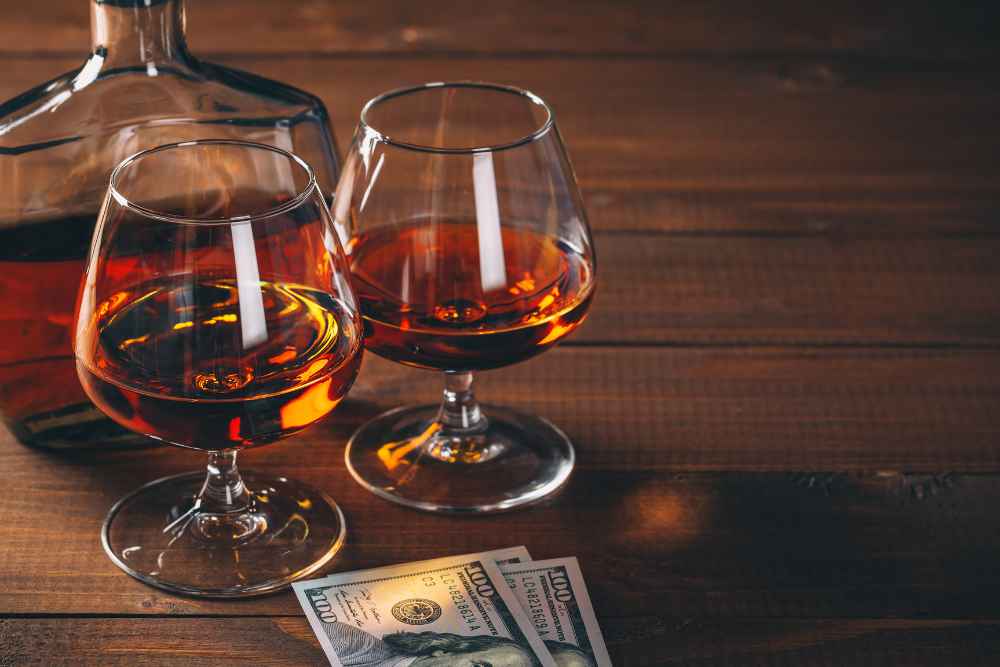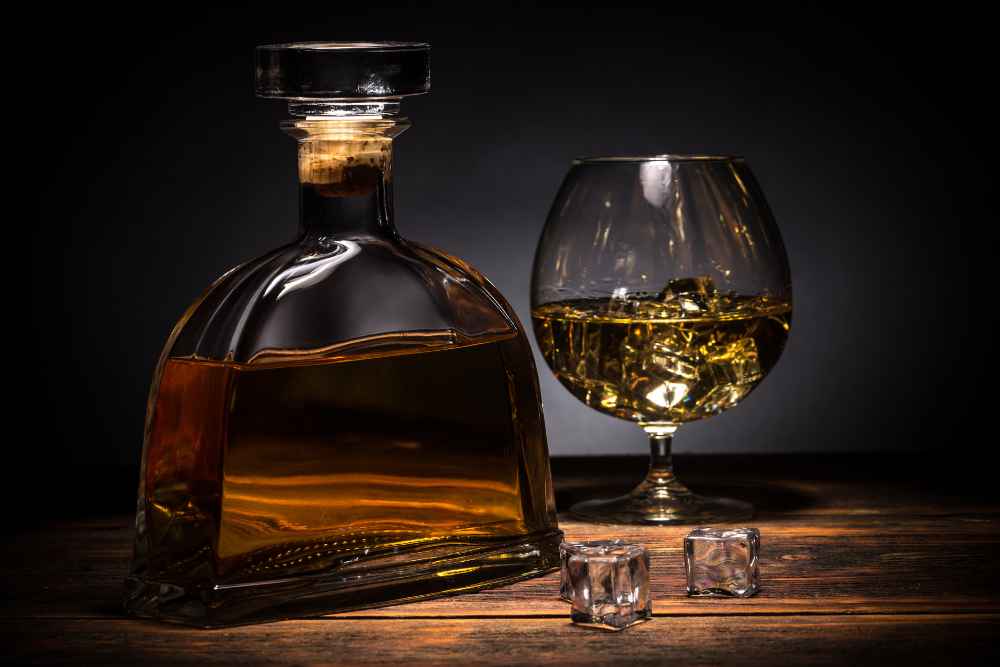This page may contain affiliate links. Please see our Disclaimer for more information. Always drink responsibly and adhere to your local legal drinking age.
Introduction
Cognac, a luxurious and exquisite spirit, has long been revered for its incredible depth of flavor and distinct characteristics. But does cognac continue to age once it’s bottled? In this blog post, we’ll delve into the fascinating world of cognac maturation, discussing factors such as aging processes, the crucial role of oak barrels in shaping flavor profiles, and ultimately addressing whether or not cognac ages in the bottle.
Key Takeaways:
- Cognac maturation involves aging in oak barrels to develop its unique flavor and aroma, with mandatory aging for at least two years under AOC rules.
- Oak barrels play a crucial role in shaping the flavor profile of cognac through the absorption of compounds from wood and the gradual interaction between oxygen and spirit inside the barrel over time.
- Factors such as type and quality of oak barrels used, temperature and humidity during maturation, age of eau-de-vie or brandy, size and shape of oak barrels, and quality of grapes used to affect the maturation time for cognac.
- Once bottled, cognac no longer ages or evolves in taste, but proper storage can ensure that its color, aroma, and flavor remain intact for an extended period.
Understanding Cognac Maturation
Cognac maturation involves the slow aging process of distilled grape wine spirits in oak barrels, with mandatory aging for at least two years to be considered cognac under AOC rules.
Aging Process Of Cognac
The aging process of Cognac is a critical element in shaping its distinctive flavors, aromas, and smoothness. This intricately crafted spirit begins its journey from grapes grown in the French region of Cognac, fermented into wine, and distilled twice to produce a clear eau-de-vie.
During aging in oak casks, the eau-de-vie absorbs various compounds from the wood, including vanillin and tannins. These elements contribute luxurious notes of vanilla, spice, and nuttiness while also imparting an amber hue to what was initially a colorless liquid.
As noted among our important facts above – cognacs must spend at least two years maturing within oak barrels before they can be labeled as such by AOC regulations.
During this barrel-aging stage, evaporation plays a role too – fondly referred to as “the angels’ share.” The porous nature of oak allows for gradual interaction between oxygen and spirit inside the barrel over time.
Mandatory Aging For Cognac
Mandatory aging for Cognac ensures the spirit’s quality and unique characteristics.
The different classifications of Cognacs like VS (Very Special), VSOP (Very Superior Old Pale), and XO (Extra Old) are directly influenced by their specific aging duration.
For example, a VS requires a minimum aging period of 2 years, while VSOP needs at least four years in oak casks. The more sought-after XO variety demands a longer maturation process – six years or more within carefully selected oak barrels.
The Role Of Oak Barrels In Cognac Flavor And Aroma
Oak barrels play a pivotal role in developing cognac’s distinctive flavor and aroma, imparting their unique characteristics to the spirit during maturation. French oak is primarily used for this process, as it is highly regarded for enhancing the aging journey of cognac, offering both structure and depth.
Over time, exposure to air through the barrel’s natural pores shapes cognac’s overall profile by concentrating certain elements and allowing others to evaporate or oxidize.
This intricate dance creates an elegant balance between sweetness and acidity that distinguishes fine-quality cognac from other brown spirits.
Moreover, each stage of barrel aging contributes particular elements to its resulting bouquet: newer oak imparts fresh vibrancy with prominent woody notes. At the same time, older casks add smoothness via subtle hints of dried fruits or floral accents.
Master blenders often skillfully blend eau-de-vie aged in both casks for added depth and sophistication.
Factors That Affect Maturation Time
Maturation time for cognac can vary due to different factors, including:
- Type and quality of oak barrels used: Cognac that is aged in new oak barrels will mature faster than those aged in older barrels. Also, the wood quality used in making the barrel can affect maturation time.
- Temperature and humidity during maturation: Higher temperatures accelerate aging, while lower temperatures slow it down. Humidity levels also affect how much water vapor is absorbed by the cognac.
- Age of the eau-de-vie or brandy: The older the distilled wine used to make the cognac (eau-de-vie), the less time it will need to mature fully.
- Size and shape of oak barrels: Larger barrels will take longer to mature cognac than smaller ones. The condition of the barrel may also affect maturation time due to increased surface area.
- Quality of grapes used in distillation: The quality of grapes used to produce wine, which is then distilled into eau-de-vie for cognac production, affects how long it takes to mature fully.
These factors contribute significantly to determining how long it will take for cognac to reach its full maturity before being bottled and shipped out for consumption or further aging purposes.
Does Cognac Age In The Bottle?
Once cognac is bottled, the aging process stops, and the contents remain the same in flavor and aroma. Learn more about how cognac matures and the role of oak barrels in its development.
No, Cognac Does Not Age Once Bottled
It is a common misconception that cognac continues to age once it has been bottled, but unfortunately, this is not the case. The aging process stops once the spirit has been removed from its oak cask and sealed in a bottle.
This means that you cannot improve or even guarantee the quality of your cognac by storing it for an extended period (unlike wine). However, bottle aging can still impact the spirit’s flavor and aroma over time – mainly caused by oxidation due to air in the bottle or exposure to direct sunlight.
Importance Of Bottle Aging
Bottle aging is essential to the cognac-making process, allowing for a harmonious integration of flavors and aromas. After the distillation and oak barrel aging, cognac is bottled to further age in a glass container.
Although cognac does not mature once bottled, bottle aging is critical in maintaining its quality. The time that cognac can be aged in the bottle varies depending on how well it is stored.
Exposure to direct sunlight, extreme temperatures, or humidity can cause the contents to deteriorate and evaporate over time, while proper storage conditions can help ensure that its color, aroma, and flavor remain intact.
Cessation Of Ageing Process In Bottle
Once cognac is bottled, the aging process stops. The spirit will not continue to mature in flavor and aroma once it’s sealed away. While wine continues evolving in the bottle, Cognac is entirely different.
As soon as it’s poured into a glass and corked up tight, chemical reactions with air stop happening quickly. The liquid remains primarily intact for years and sometimes even decades but no longer matures with age.
That being said, other factors at play can affect the state of an unopened bottle of cognac; heat and direct sunlight can degrade a spirit over time while storing bottles upright runs the risk of oxidation through partial exposure to air.
FAQ
1. Does cognac continue to age and develop inside the bottle after it has been bottled?
No, once cognac has been bottled, it stops maturing and will remain unchanged regarding the flavor profile.
2. How does cognac mature during the aging process before bottling?
Cognac matures in special oak barrels that have been charred on the inside, giving them a unique flavor profile while allowing tiny amounts of oxygen to enter the barrel over time.
3. What factors can affect how quickly or slowly cognac matures?
The temperature and humidity levels where the barrels are stored significantly affect how quickly or slowly cognac ages. Additionally, factors such as the type of oak used for the barrel and how long it is aged can influence its final taste.
4. Can I store an open bottle of cognac for an extended period without affecting its overall quality?
If your bottle is sealed tightly with a cork stopper, you can store it unopened for several years without impacting its quality or taste. Once opened; however, exposure to air may cause subtle changes in flavor after a few months if not entirely consumed within a relatively short amount of time; thus, bottles should be kept upright to minimize oxidation impact at room temperature out of any direct sunlight/heat sources away from solid odors & vibrations because these could all potentially speed up the deterioration process.
Conclusion
In conclusion, cognac maturation is a fascinating process that involves careful aging in oak barrels to develop its distinctive flavor and aroma.
However, once bottled, cognac no longer ages or evolves in taste. Instead, storing it correctly can ensure that the spirit remains intact for an extended period.
Whether you prefer VSOP or XO cognac, understanding the aging process and proper storage techniques can help elevate your experience with this classic brown spirit.


